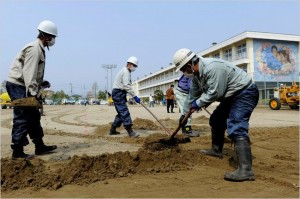 It’s rare to see a reporter educated enough on nuclear matters to know the right questions to ask, and to provide reliable perspective. I take my hat off to Matthew L. Wald. Read the article here.
It’s rare to see a reporter educated enough on nuclear matters to know the right questions to ask, and to provide reliable perspective. I take my hat off to Matthew L. Wald. Read the article here.
Category: Prespective
 This New York Times article by Hiroko Tabuchi describes the anguish of the parents of Fukushima City, whose children are going to contaminated schools. As I have said before, it is hard to see a happy ending to this story. The best protection from radiation is shielding and distance. I would never let my children be exposed to these radiation levels, said an advisor to Prime Minister Kan. I agree. This is not a healthy environment for children. Delays in moving them will only add to the uncertainty and suffering. Someone needs to speak out and let people know this is not a situation that can be normalized. There is risk that will not go away for some time.
This New York Times article by Hiroko Tabuchi describes the anguish of the parents of Fukushima City, whose children are going to contaminated schools. As I have said before, it is hard to see a happy ending to this story. The best protection from radiation is shielding and distance. I would never let my children be exposed to these radiation levels, said an advisor to Prime Minister Kan. I agree. This is not a healthy environment for children. Delays in moving them will only add to the uncertainty and suffering. Someone needs to speak out and let people know this is not a situation that can be normalized. There is risk that will not go away for some time.
People are prone to compare events to get some idea of magnitude or significance. Fukushimi Daiichi certainly could have been worse, given the scope of the events that triggered it – earthquake and tsunami – and the breakdown of infrastructure associated with those events. People ask is it bigger than TMI? Yes, as a whole. But then if you were one of the minority affected by TMI it doesn’t make you feel any better. Is it worse than Chernobyl? Maybe, but we are still sorting through it. The fact that the spent fuel rods are on top of the reactors, and that three reactors melted down – without catastrophic release of more than has been released – gives reasons to be thankful that things are not worse than they are. Yet it is very troubling to see children playing on radioactive playgrounds, and people trying to live normal lives in neighborhoods where geiger counters buzz rather than click. A happy ending to this story is hard to imagine, but I find myself thinking if we can just get the children to safe places so they can enjoy normal lives without fear of later health problems, then we will have done what we can to protect our most precious resources – our children, our future. Then we can sleep at night and know we have done the right thing, no matter what it cost to do it. Of course there are consequences that are economic, political, cultural, societal, legal. But if we don’t do the right thing despite the costs, we aren’t living up to our full potential as a human society. Fukushima isn’t only a Japanese problem. The radioactive particles drifting in school yards also came from England, France, America, and other places. It’s not a time to place blame, but to work together to show how big, not small, we are as a world community. We are now an international society and we all share responsibility for these children. Let’s not forget them, please.
Comments closed
